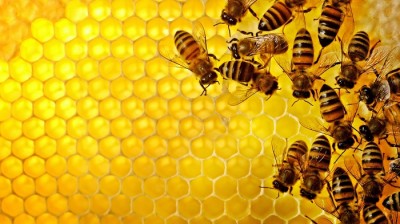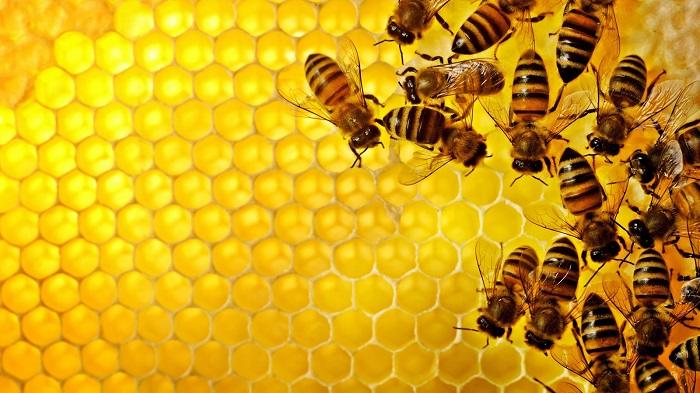
Most people are familiar with only two bee products: honey and beeswax. But there are three others, unbeknownst to many, that are just as useful to humans — maybe even more: bee pollen, royal jelly and propolis. Extracts of these products have been lining the shelves of health food stores lately, and for good reason.
In the Philippines, I once went to see a top bee farmer who was making a name for himself selling such products. And, much to my amazement, he offered yet another unique “item”: bee venom. A lady who appeared to be a regular client walked into his store, limping, suffering from painful gout in her leg. The beekeeper made her sit down, and left, and came back with a honeybee, which he placed on the woman’s swollen ankle. He let the bee sting her leg and waited. I expected the woman to cringe but she didn’t. Instead, she was totally relaxed and seemed grateful to be getting this unconventional treatment. She then stood up and walked around, letting the venom circulate in her leg. Needless to say, watching the whole thing blasted my previously Western view of disease and how it should be treated – that is, by way of conventional medicine.
New All-Natural Capsule Protects You From Dangerous Toxins And Pollutants!
I left ahead of the woman, so I didn’t know if the pain and swelling subsided right away. But the fact that she came there as a regular proved she was getting some sort of relief for her gout. Regardless, that experience made me realize one thing: Bees have so much more benefits to offer humans than I thought.
Propolis And Its Many Benefits
In this article, I would like to focus on propolis – one that’s probably least heard about among the three bee products mentioned above. Propolis is a substance honeybees produce when they collect resin from the buds, saps and barks of trees and mix it with their saliva and wax. The result is a brownish paste that’s sticky and pliable when fresh, but gets hard and brittle when it cools. Propolis is also called bee glue, propolis wax, propolis balsam and, as unappealing as it may sound, hive dross. Bees use it to fill crevices in their hives, and seal and varnish their honeycombs – much like how we humans paint and caulk our homes.
The story continues below the video:
Most backyard beekeepers just discard propolis, not knowing there is tremendous use for it in the health and manufacturing industries. Propolis is used in making cosmetics, chewing gum, car wax and wood varnish. Currently, researchers are studying it for its potential as a dental sealant and tooth enamel hardener.
The composition of propolis varies from place to place, season to season. It’s largely dependent on the trees and flowers of a local region. Propolis found in North America is different from the kind collected in Asia. That’s why their color can also vary, from green to red to brown and black. Typically, in northern temperate climates, bees gather propolis from the buds of conifers, poplars and birch. The resin of these trees is known to contain properties that seal wounds and protect against fungi, bacteria and insects.
Germ-killer
Bees use it to protect and disinfect their hives. When intruders like lizards and mice find their way into the hive and die, bees may not be able to carry them out. Instead, they immobilize and decontaminate the intruders by coating their carcasses in propolis, thus embalming them on the spot. Sound morbid? Just think of what that germicidal ability can do to microbes and pathogens in our bodies.
Since ancient times, propolis has in fact been used to treat all kinds of ailments across the world – from acne to cancer, osteoporosis to tuberculosis. According to the WebMD.com, Greeks during the time of Aristotle in 350 B.C. used propolis to cure abscesses, the Assyrians used it to treat wounds and tumors, and the Egyptians, to embalm mummies. In the modern world, though, accounts of its health benefits are largely anecdotal. Because the composition of propolis depends on so many variables — it can even vary from hive to hive – doing controlled and repeatable clinical studies has proven difficult.
The only thing the National Institute of Health can confirm so far is that propolis is “possibly effective” for treating cold sores, genital herpes and post-surgery mouth pain. Countless studies have been done on propolis, but all these are considered “preliminary” and “non-conclusive” by modern medicine. What many researchers do commonly find is that propolis has analgesic, antibiotic, anti-inflammatory and anti-microbial properties, fighting many different kinds of bacteria, viruses, fungi, yeasts and protozoa.
The Hidden Secrets Of Making Herbal Medicines…Right At Your Fingertips!
Aside from its proven effect in curing warts, canker sores and the common sore throat, propolis is believed to play a role in reducing tooth decay and in promoting the health of injured teeth. (1)
Immune-booster
Normally, propolis is composed of around 180 natural compounds, many of which are concentrates of polyphenols and flavonoids, plant antioxidants which benefit the immune system by fighting free radicals that damage our red blood cells.
The fact that the bees use propolis to prevent disease and parasites from entering their hives, says a lot already. Bees don’t have an immune system of their own, so they depend on propolis to protect their nest, eggs and larva against infection, and to keep the hive in a sterile, temperature-stable condition. The very name “propolis” is derived from the Greek words “pro” meaning before, and “polis” meaning “city.” It can be taken to mean “for the benefit of” or “in defense of” the city. It shouldn’t be far-fetched that propolis would do the same for our bodies.
A study at the University of Minnesota showed how propolis can provide defense against infection and provide overall immune support. Researchers found that bees housed in a nest box coated with propolis had lower bacterial levels in their body, and showed “quieter” immune systems compared to those from colonies with no propolis coating. (2)
Anti-Swell
What I had witnessed at the bee farm was actually a demonstration of propolis’ anti-inflammatory action. Inflammation causes and frequently accompanies problems like arthritis, asthma, Alzheimer’s, heart disease and even common burns and urinary tract infections. Propolis has Caffeic Acid Phenethyl Ester (CAPE), a natural compound that suppresses acute immune and inflammatory responses in our bodies. Scientists, for example, have found that the CAPE in propolis is very effective at holding back inflammatory agents that cause osteolytic bone disease. (3) Voila! The reason why the ancients used propolis to treat osteoporosis!
The story continues below the video:
Cancer-fighter
That same CAPE has been proven effective in reducing cancer. This was observed by scientists when they treated mice skin with bee propolis and exposed it to TPA, a chemical that induces benign skin tumors or papillomas. CAPE significantly reduced the number of papilloma on the mice. (4)
Propolis has been shown to not only reduce cancer cell growth, but also induce their apoptosis (cell death). The CAPE in propolis was also shown to enhance the benefits of chemotherapy by controlling the mdr-1 gene, which is what causes the resistance of cancer cells to chemo. (5)
Where to Find Propolis
Propolis is usually found in small amounts in honey. If you regularly consume raw honey, chances are you’re already ingesting — and benefitting from — propolis.
Propolis is available in pharmacies and alternative health stores. It comes in a wide assortment of preparations: supplements like tablets, capsules, powders, extracts and lozenges; topical forms like creams, ointments, lotions and tinctures; therapeutic aids like nasal and throat sprays; and even dental products like toothpaste and mouthwash. But if you have a beekeeping neighbor, you could get it fresh and raw. Maybe even free.
Do you use bee propolis? What advice would you give others? Share your thoughts in the section below:
(1) https://www.drugs.com/npc/propolis.html
(2) https://empoweredsustenance.com/propolis-benefits/
(3) https://www.bee-pollen-buzz.com/health-benefits-of-propolis.html
(4) https://cancerres.aacrjournals.org/content/48/21/5941.long
(5) https://www.ncbi.nlm.nih.gov/pmc/articles/PMC3144783/










